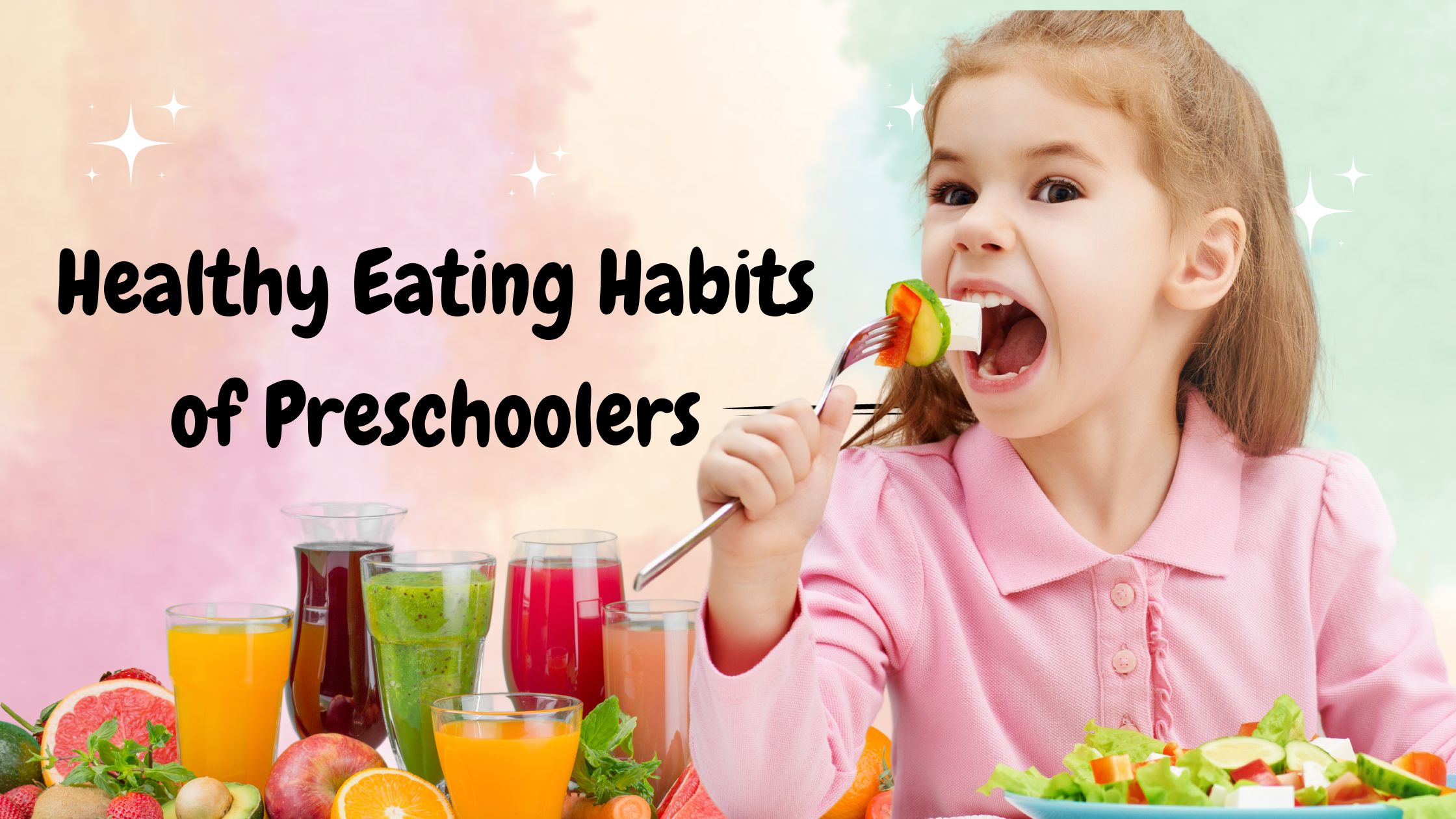
Healthy Eating Habits of Preschoolers
Preschoolers are at a crucial stage of development, and providing them with healthy eating habits is essential for their growth and well-being. By instilling nutritious eating habits early on, parents can set the foundation for a lifetime of good health. In this article, we will explore the benefits of healthy eating for preschoolers and discuss practical tips for establishing and maintaining these habits. Healthy Eating Habits of Preschool.
Benefits of Healthy Eating for Preschoolers
Physical Development: Healthy eating plays a vital role in supporting a child’s physical development. Nutrient-rich foods provide the necessary vitamins, minerals, and energy for their growing bodies. A balanced diet promotes proper bone and muscle development, boosts immunity, and helps maintain a healthy weight.
Cognitive Development: Proper nutrition is also linked to cognitive development in preschoolers. Nutrients like omega-3 fatty acids, found in foods such as fish and walnuts, contribute to brain development and improve cognitive function. A well-nourished child tends to have better concentration, memory, and overall cognitive abilities.
Emotional Well-being: Eating habits can significantly impact a child’s emotional well-being. A diet rich in whole grains, fruits, vegetables, and lean proteins provides the necessary nutrients to support mental health. On the other hand, diets high in processed and sugary foods have been associated with increased risk of behavioral problems and mood swings.
Establishing Healthy Eating Habits
Introduce a Variety of Foods: Introducing a wide range of foods to your preschooler exposes them to different flavors and textures, making them more likely to accept and enjoy a diverse diet. Offer fruits, vegetables, whole grains, lean proteins, and dairy products to ensure a well-rounded nutrient intake.
Set Regular Meal and Snack Times: Establishing consistent meal and snack times helps create a structured eating routine for your preschooler. This approach promotes hunger awareness and prevents excessive snacking. Aim for three balanced meals and two healthy snacks throughout the day.
Be a Role Model: Children often imitate the behavior of their parents or caregivers. Set a positive example by practicing healthy eating habits yourself. Let your preschooler see you enjoying nutritious foods and making mindful choices. Engage in family meals together to create a supportive and encouraging environment.
Making Mealtime Enjoyable

Involve Your Child in Meal Preparation: Encourage your preschooler to participate in age-appropriate kitchen activities. Let them wash vegetables, stir ingredients, or arrange food on their plate. Involving them in meal preparation instills a sense of pride and ownership, making them more likely to try new foods.
Create a Pleasant Dining Environment: Make mealtimes a pleasant and stress-free experience. Create a calm and inviting atmosphere by turning off screens, playing soothing music, or engaging in light conversation. Avoid distractions that may hinder your child’s focus on eating.
Offer Age-Appropriate Portion Sizes: Serve appropriate portion sizes for your preschooler’s age and appetite. Avoid pressuring them to finish their plate or overfeeding them. Let them recognize their hunger and fullness cues, fostering a healthy relationship with food.
Encouraging Nutritious Choices
Provide Nutrient-Dense Foods: Offer a variety of nutrient-dense foods that are rich in vitamins, minerals, and essential nutrients. Include colorful fruits and vegetables, whole grains, lean proteins, and dairy products in your child’s meals and snacks. These foods provide the necessary building blocks for their growth and development.
Limit Processed and Sugary Foods: Minimize the consumption of processed and sugary foods in your preschooler’s diet. These foods often lack nutritional value and can contribute to health issues such as obesity and dental problems. Instead, opt for homemade snacks and limit sugary drinks, replacing them with water or milk.
Promote Water Consumption: Encourage your preschooler to drink an adequate amount of water throughout the day. Water is essential for hydration and helps maintain overall health. Limit the intake of sugary beverages and emphasize the importance of water as their primary choice of drink.
Dealing with Picky Eating
Be Patient and Persistent: Picky eating is common among preschoolers, but it is essential to remain patient and persistent. Offer a variety of foods repeatedly, even if they are initially rejected. It may take several exposures before a new food becomes familiar and accepted.
Offer Foods in Different Ways: Be creative in how you present foods to your picky eater. Experiment with different cooking methods, flavors, and textures. For example, if your child refuses steamed broccoli, try roasting it with a sprinkle of cheese for added flavor.
Seek Professional Advice if Needed: If your child’s picky eating habits persist and significantly affect their nutrition and growth, consider seeking guidance from a healthcare professional or a registered dietitian. They can provide personalized advice and strategies to address specific concerns.
Establishing healthy eating habits for preschoolers is crucial for their physical, cognitive, and emotional development. By introducing a variety of nutritious foods, setting a positive example, and making mealtimes enjoyable, parents can foster a lifelong appreciation for healthy eating. Encouraging nutritious choices and navigating picky eating challenges with patience and persistence will contribute to their overall well-being and future health.
FAQs
How can I handle my preschooler’s food preferences? Understanding and respecting your preschooler’s food preferences is important. Offer a variety of foods and be patient as their tastes may change over time. Encourage them to try new foods, but never force or pressure them.
What should I do if my child refuses to eat fruits and vegetables? If your child is resistant to eating fruits and vegetables, there are strategies you can try. Start by offering small portions alongside foods they already enjoy. Be creative in presenting fruits and vegetables, such as cutting them into fun shapes or making smoothies. You can also involve them in grocery shopping or gardening to develop a connection with these foods.
Can I introduce dietary restrictions to my preschooler? Introducing dietary restrictions to a preschooler should be done with caution. It’s crucial to consult with a healthcare professional or a registered dietitian before implementing any significant dietary changes. They can help ensure that your child’s nutritional needs are being met while accommodating any specific dietary restrictions.
How do I manage meals when my preschooler is a picky eater? Managing meals with a picky eater can be challenging. It’s important to offer a variety of foods and provide a balanced meal. Offer at least one food you know they enjoy alongside new or less preferred options. Avoid pressuring or bribing your child to eat, as this can create negative associations with food. Remember to be patient, and consistent, and maintain a positive mealtime environment.
We also run affordable nurseries in Al Mankhool. Click here to enrol your child today!
Preschoolers are at a crucial stage of development, and providing them with healthy eating habits is essential for their growth and well-being. By instilling nutritious eating habits early on, parents can set the foundation for a lifetime of good health. In this article, we will explore the benefits of healthy eating for preschoolers and discuss…
